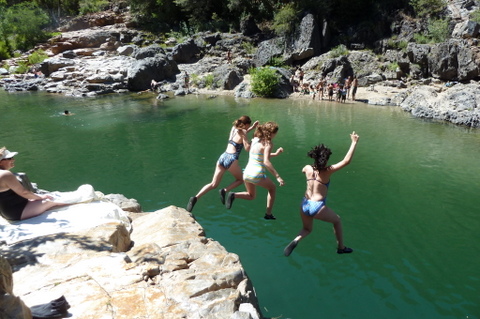If you are having trouble viewing this e-mail, click here for web version.
 |
Vrtti July 2014 - Yoga and Death |
 |
Dear Yoga Friends, As children, if we are lucky, we are somewhat shielded from death. I have a memory of asking my mother about it when I was maybe four. She reassured me with words like "that's something that is so far in the future that it's really nothing to be concerned about". Somehow that must have worked because I don't recall worrying about death much thereafter during my childhood. But over the years, I have lost three of the five members of my family of origin, as well as a number of close friends and relatives. Today happens to be the 22nd anniversary of my mother's death, and also my younger daughter's 13th birthday, a meaningful coincidence. My situation is typical as we move into middle age and beyond. The big data folks out there selling us insurance can tell us our probable lifespan. The fact is our lives are finite. Heavy stuff. Yoga gives us a fresh perspective, both on life and death, and it turns out that these opposites are just flip sides of the same coin. Yoga teaches us a way around life's afflictions, two primary ones being attachment and aversion. Can we learn to let go and also not push away, without becoming some sort of wishy-washy being? I think so, and yoga practice helps teach us how. About attachment to life, this is a big one. In the yoga sutras, Patanjali decides that it's worth calling out this particular attachment as another primary affliction, called abhinivesah (Sutra II.9):
My take on this sutra is that we cannot live life fully if we are in fear of losing it. This is not to say we are to be indifferent about being alive; far from it. Whether we are healthy or diagnosed with a terminal illness, we have the gift of each moment in some finite string of days of unknown number. Yoga also teaches us to respect life and make the most of it by seeking a higher purpose, something beyond just gratifying the senses. From the perspective of asana practice, I believe that the poses which are linked most closely to death are backbends. Yes, you can make the argument that it is savasana (corpse pose), but let's put that one aside for the moment. In addition to the challenges in performing backbends safely, they are advanced poses for psychological reasons. The back of the body is the unknown. We learn to dive into water facing forward before we learn a backwards dive because going headfirst forward into a depth is scary enough. Interestingly, backbends are also the go-to poses for depression and loss, because of the way they stimulate the nerves, give energy, and uplift the mood. Perhaps backbends allow us to cultivate a healthier relationship to death as the great unknown. But these are just words. Maybe I should be practicing now and not typing. I welcome your thoughts as always! Namaste, Chad |
|
|
